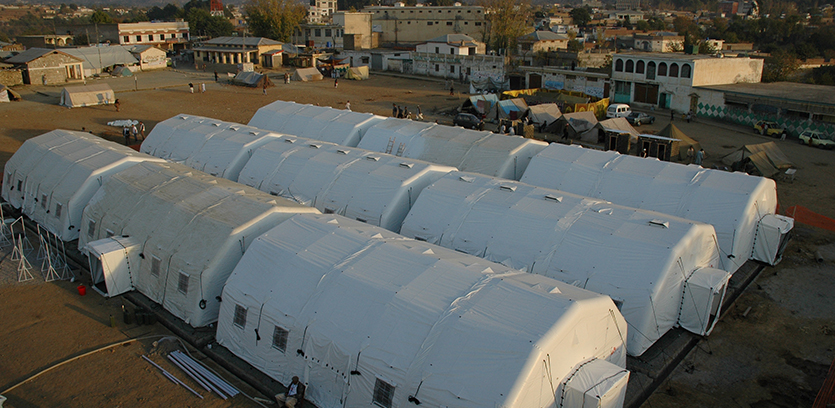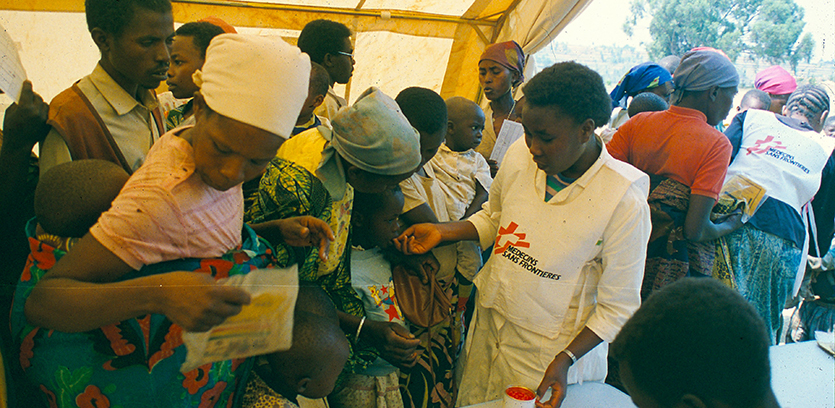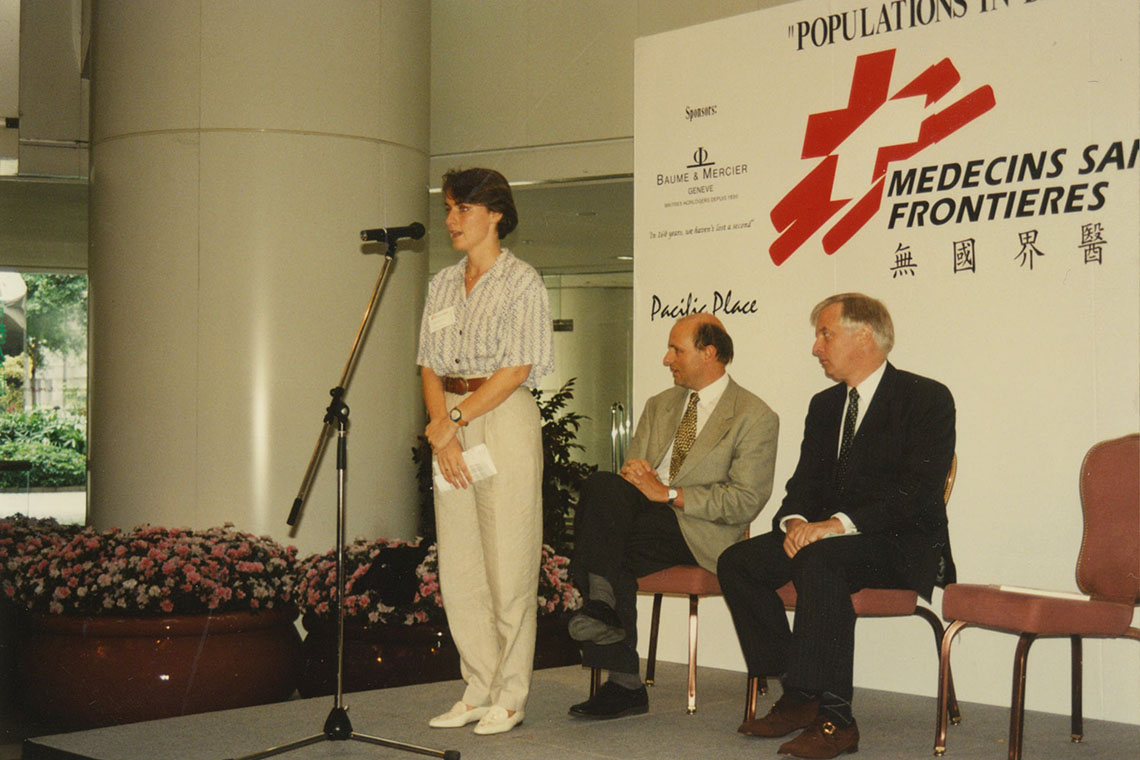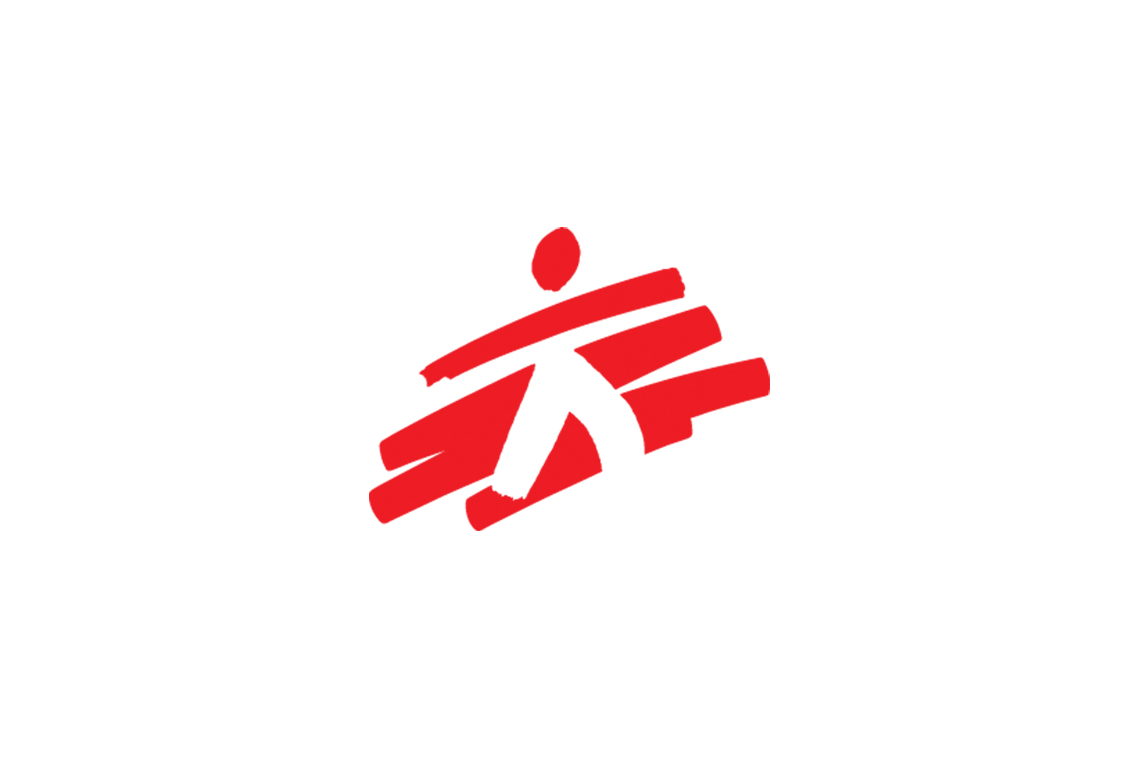
Fifty Years Pushing The Limits Of Medical Action
We always have to make decisions in our daily lives.
When there are many needs but resources are limited, how would you choose?
MSF chooses to adapt and move forward.
Over the past 50 years, field workers of MSF faced dilemmas and needed to make choices like you do. We adapted to different situation and strived to provide emergency response with limited resources.
As part of MSF's commemoration and reflection to mark 50 years of the organisation's existence, we have brought together a collection of some of the most important moments from that history, which helped to define our purpose and to show how we could overcome all kinds of obstacles that can get in the way of the relief of suffering. There are stories about some of the most extreme disasters that have hit the world over that time. Some of them natural, many of them the result of human folly or cruelty. We have set them out in a similar style, so that you can follow the development from a description of the overall situation at that time, to the particular problem we had to overcome, to the way we responded. We were certainly not able to answer all of the challenges very successfully. Some of them were far too big for one medical aid organisation to deal with. Some are issues that we are still struggling with.
The point of the collection is to let you see the scale and range of the difficulties facing humanitarian aid in a world that throws up new and sometimes desperate challenges to human health and welfare. I hope you enjoy the ride, and keep following MSF's journey.
MSF HISTORY
MSF is founded
A group of doctors and journalists founded Médecins Sans Frontières / Doctors Without Borders (MSF), the first non-governmental humanitarian organisation to specialise in emergency medical assistance, in the wake of the war and accompanying famine in Biafra, Nigeria, as well as the floods in eastern Pakistan (now Bangladesh). (Photo credit: ©️D.R.)
Soviet Union invades Afghanistan
Start of the first medical intervention of MSF in Afghanistan just after the Soviet invasion of the country. The medical teams clandestinely cross the Pakistan–Afghan border and travel with mules for several weeks to reach injured civilians living in remote areas. (Photo credit: ©️Generic MSF)
Extensive nutrition programme for famine victims
MSF starts its first large-scale nutritional programme to treat malnutrition in hunger-stricken regions of Ethiopia. The following year, MSF is ordered to halt its activities after denouncing the government's misuse of aid to forcibly relocate millions of its people, a policy which results in tens of thousands of deaths. (Photo credit: ©️Patrick Frilet)
Vietnam refugees
MSF starts working in Hong Kong during the height of an influx of Vietnamese boat people. For 10 years, we provided medical services in refugee camps and detention camps in conjunction with UNHCR, the Hong Kong Government and other NGOs. (Photo credit: ©️Generic MSF)
Genocide in Rwanda
MSF remains in the capital, Kigali, throughout the genocide of more than 800,000 Tutsis and moderate Hutus by Hutu extremists.
One million Rwandan refugees later flee to the small town of Goma, Zaire (now the Democratic Republic of Congo). MSF provides aid in the refugee camps there and in other neighbouring countries.
The killings had led MSF to take an unprecedented decision to call for an international military intervention – "Doctors can't stop genocide". (Photo credit: ©️Roger Job)
Srebrenica Massacre
MSF is the only international presence during the fall of the Srebrenica enclave. The organisation witnesses the fall of the UN "protected zone" and condemns the subsequent massacre of about 8,000 Bosnian Muslim men and boys, and the mass deportation and abuse of many thousands more by Serbian troops. (Photo credit: ©️Th. Pontus)
Cholera outbreak in Africa
A cholera epidemic on an unprecedented scale spreads in 14 African countries, from Tanzania to Kenya and Mozambique. MSF teams work with local authorities to head off a further upsurge of the epidemic with the onset of the rainy season in the coming year. (Photo credit: ©️Roger Job)
MSF awarded Nobel Peace Prize
MSF is honoured for its "pioneering humanitarian work on several continents." At the award presentation ceremony in Oslo, Norway, MSF calls on the Russian government to stop the indiscriminate attacks on civilians in Chechnya.
The prize money received funds the creation of the Access Campaign, an international effort to push for increased access to quality affordable medicines for the world's poor. It is created from the field experience of our doctors and nurses who are increasingly frustrated by the lack of medicines and diagnostics to treat infectious diseases. (Photo credit: ©️Patrick Robert)
Treatment of HIV/AIDS in resource-limited settings
MSF starts providing antiretroviral treatment to people living with HIV/AIDS in Thailand, and within one year opens treatment projects in Cambodia, Cameroon, Guatemala, Kenya, Malawi, and South Africa, primarily using generic antiretroviral medicines. (Photo credit: ©️Gideon Mendel)
Tsunami hits South and SE Asia
A tsunami triggered by an earthquake in the Indian Ocean causes many casualties.
MSF receives USD133 million from the public and asks people to stop making donations for the crisis, having received more funding than is needed for its medical programmes in the region. MSF also asks donors to reallocate some of the funds received - to which the vast majority agree - to other MSF's emergency medical programmes around the world.
MSF Hong Kong sends 13 field workers to the severely hit Aceh Province in Indonesia. (Photo credit: ©️Francesco Zizola/Noor)
Five MSF aid workers murdered in Afghanistan
Fasil Ahmad, Besmillah, Hélène de Bier, Pim Kwint, and Egil Tynaes are shot in Badghis Province. MSF leaves Afghanistan after providing assistance for 20 years. Five years later in 2009, the organisation returns to the country and begins supporting hospitals in Kabul and in Lashkargah, the capital of Helmand Province, and later in Kunduz and Khost. (Photo credit: ©️Alain Frilet)
Refugees and asylum seekers in Malaysia
MSF opens primary health care, mental health consultations and referrals for refugee and asylum seeker communities in and around Kuala Lumpur. These people often have no official status and face difficulties in accessing healthcare. We also provide community health education, psychosocial and mental health training for NGOs, community groups and volunteers from refugee and asylum seeker communities. After building up the capacity of local partners through training and direct support of clinical services, MSF handed the project over to local partners in April 2007. (Photo credit: ©️Erwin Vantland)
Nutrition crisis in Niger
MSF responds to an overlooked and neglected malnutrition crisis, treating 63,000 severely malnourished children in Niger on an outpatient basis with a new therapeutic ready-to-use-food. The first time it has used this treatment protocol on such a massive scale. (Photo credit: ©️Christiane Roth)
Devastating earthquake hits Pakistan and India
76,000 people die and three million people are left homeless by the massive earthquake that hits the Kashmir region of Pakistan and India. MSF runs mobile clinics to reach people trapped in remote villages and sets up inflatable surgical tents to treat the injured. (Photo credit: ©️Ton Koene)
Conflict in Lebanon
The first MSF team enters Lebanon one week after the conflict starts. Despite the effort to provide emergency aid to hundreds of thousands of displaced, ongoing airstrikes make it difficult to access the south. When the last functioning bridge across the Litani River in southern Lebanon is destroyed, this human chain is the only practical means for transporting four tonnes of supplies. (Photo credit: ©️Sergio Cecchini)
Conflict in Gaza
MSF supports hospitals in Gaza following an Israeli offensive launched to counter militants firing crude rockets into Israel. After a ceasefire is announced, MSF opens a surgical hospital and also offers post-operative and psychological care. (Photo credit: ©️Bruno Stevens)
Earthquake and Cholera Outbreak in Haiti
After a devastating earthquake hits Haiti, which brings an estimated 222,000 deaths and makes millions of people homeless, MSF launches the largest emergency response in its 40-year history. In the first 10 months, MSF treats more than 358,000 patients and performs more than 16,500 surgeries. A second emergency response is mobilised later in the year to combat a fast-spreading cholera outbreak. MSF treats around 60% of all cholera cases in the entire country. (Photo credit: ©️Kadir Van Lohuizen/Noor)
Civil unrest in Middle East and Northern Africa
Political protests erupted in countries across Africa (Libya, Tunisia and Egypt) and the Middle East (Syria, Yemen, Bahrain), with MSF supplying and assisting hospitals & health structures where medical staff treated the injured. MSF also helps people who seek refuge in neighbouring countries. (Photo credit: ©️Alessio Mamo)
Aid workers under attack
Aid workers face increasing dangers while working in conflict zones.
In October, Montserrat Serra and Blanca Thiebaut, both Spanish, were abducted from the refugee camp in Dadaab, Kenya, where they were working with some of the most vulnerable Somali refugees. Less than three months later, two MSF field workers – Dr. Andrias Karel Keiluhu and Philippe Havet, Indonesian and Belgian nationals respectively - were killed in Mogadishu, Somalia, where they are working to provide emergency medical assistance to displaced people and residents of the city.
MSF closed its project in Mogadishu. Serra and Thiebaut were released in 2013 after 644 days in captivity. (Photo credit: ©️Anna Surinyach)
Multiple emergencies in South Sudan
A year after gaining independence in July 2011, the newest African country suffers violent clashes, an influx of refugees from Sudan, disease outbreaks such as diarrhea hepatitis E and malaria, and malnutrition.
接近170,Approximately 170,000 refugees arrive in the inhospitable area of Maban County, Upper Nile State and Yida camp in Unity State. They are often totally exhausted, sick and malnourished. MSF struggles to cope with their multiple needs and the lack of international support. (Photo credit: ©️Hereward Holland)
Super Typhoon Haiyan response
MSF HK, as the leading partner section supporting the operations in the Philippines, gives significant direct operational support to the Typhoon Haiyan emergency response in the country and contributes financial and human resources. (Photo credit: ©️Agus Morales)
Ebola epidemic in West Africa
The largest outbreak of Ebola in history is officially declared on 22 March in Guinea. It claims more than 11,300 lives in six affected countries in West Africa, including more than 500 healthcare staff.
At the peak of the epidemic, MSF employs nearly 4,000 national staff and over 325 international staff. MSF admits a total of 10,376 patients to its Ebola management centres, of which 5,226 are confirmed Ebola cases. The outbreak ends in June 2016. ((Photo credit: ©️Anna Surinyach/MSF)
Sea and Rescue in Mediterranean
Every year, thousands of people fleeing war, persecution and poverty at home attempt the treacherous journey across the Mediterranean. Countless lives are lost on the way.
Since May 2015, MSF has provided search and rescue capacity, or provided medical care during search and rescue operations, in the central Mediterranean Sea. In total, MSF teams have assisted more than 81,000 people. until Aug. 29, 2020.
In May 2021, MSF returned to search and rescue with our own search and rescue vessel, Geo Barents after a pause of a couple of months. (Photo credit: ©️Avra Fialas)
The Rohingya Refugee Crisis
Since 25 August, more than 655,000 Rohingya have fled to Bangladesh, following targeted violence against them in the neighbouring Rakhine state, Myanmar.
Most are living in dire conditions in refugee camps. In response, MSF expands its operation in the area, covering water, sanitation and medical activities for refugees. (Photo credit: ©️Antonio Faccilongo)
Covid-19 Pandemic
An outbreak of a new coronavirus turns into a worldwide pandemic, with COVID-19 infecting nearly 85 million people and claiming nearly 2 million lives in 2020 alone. Amid mounting challenges, MSF teams race to ensure access to healthcare is maintained for people, and respond to the pandemic – in both the countries we work in and countries we have never had to respond in before. We also urge pharmaceutical companies not to profit off the pandemic and ensure fair and equitable vaccine allocation. (Photo credit: ©️Abhinav Chatterjee/MSF)

READ ALSO

Pakistan Earthquake
On Saturday 8 October 2005, an earthquake measuring 7.6 on the Richter scale, one of the biggest in recent years in this region, hit Pakistan, North India and Afghanistan. By December, over 73,000 were estimated to be killed, 128,000 injured and over 2.8 million displaced in Pakistan.

Rwanda Genocide
On 6 April 1994, the plane carrying the Rwandan President was shot down as it approached the capital, Kigali. The slaughter — primarily of the Tutsi minority — commenced in the days that followed.
Copyright ©️ Médecins Sans Frontières Hong Kong. All rights reserved.








.jpg)
.jpg)
.jpg)
.jpg)
.jpg)
.jpg)
.jpg)
.jpg)
.jpg)
.jpg)
.jpg)

.jpg)
.jpg)
.jpg)
.jpg)
.jpg)
.jpg)
.jpg)
.jpg)
.jpg)
.jpg)
.jpg)
.jpg)
.jpg)

.jpg)
.jpg)
.jpg)
.jpg)
.jpg)
.jpg)
.jpg)
.jpg)
.jpg)
.jpg)
.jpg)
.jpg)

